The Best Incentive Compensation Management Software
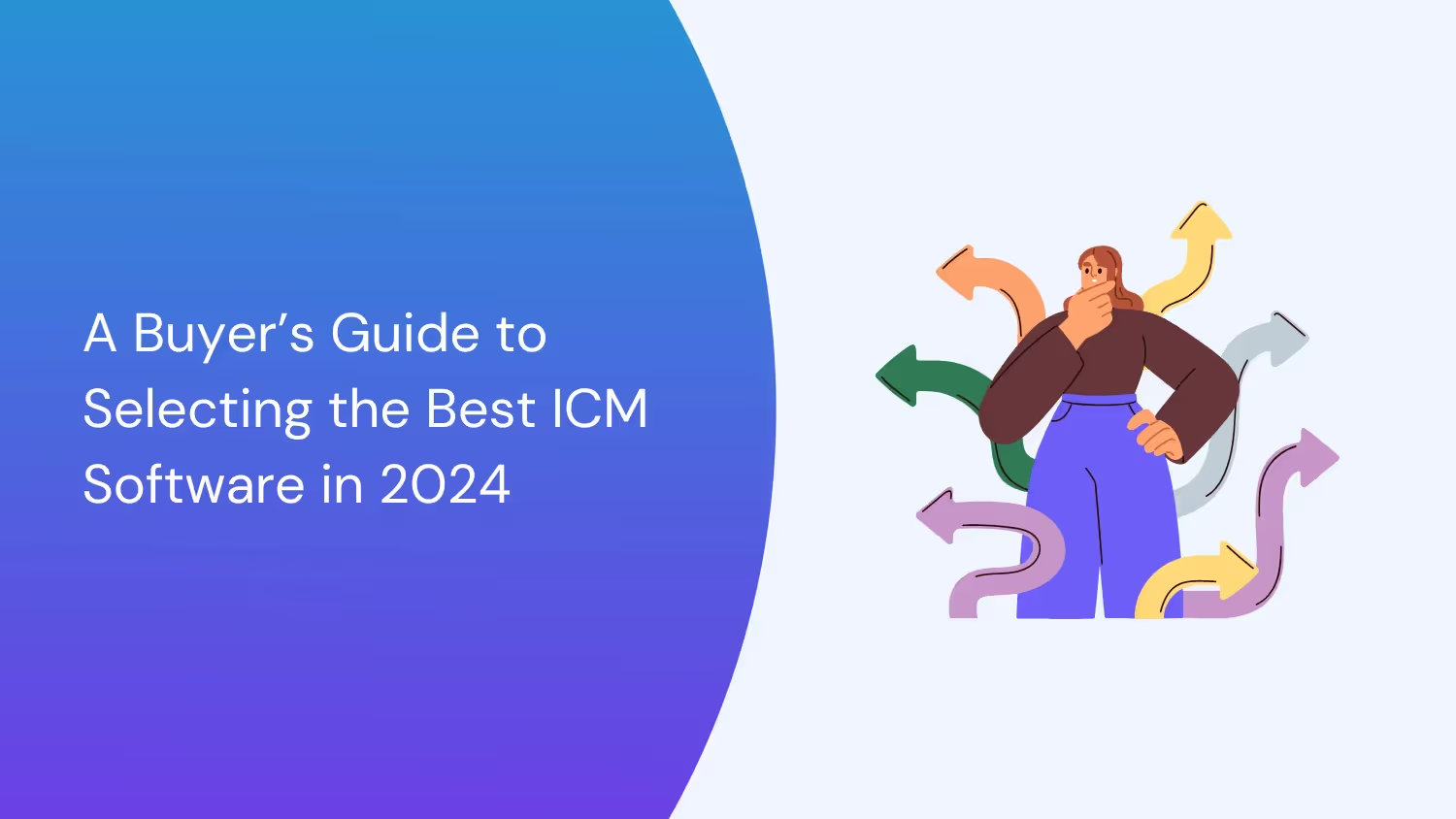
Incentive Compensation Management: Top Tools
Sales incentives are powerful—they fuel performance and drive revenue growth. But managing them? That’s a whole different challenge.
Finance teams often get stuck in a tangle of spreadsheets, complex formulas, and manual processes—leading to errors, payment delays, and rising tension between finance and sales. In fact, Gartner reports that only 24% of sellers truly understand how their incentives are calculated when spreadsheets are involved. If reps don’t understand how they’re being paid, how can they stay motivated?

Here’s what manual sales compensation management typically results in:
- ❌ Calculation errors → Disputes and financial losses
- ❌ Time-consuming processes → Delays in commission payouts
- ❌ Lack of transparency → Eroded trust and low morale
Enter ICM software—your game-changing solution.
With the right Incentive Compensation Management (ICM) software, you can:
- ✅ Reduce errors by up to 90% and cut dispute resolution times by over 40%
- ✅ Cut admin time by 50%, unlocking major cost savings
- ✅ Motivate your sales teams with clear, consistent, and fair compensation
McKinsey found that optimizing incentive plans drives sales performance 50% more effectively than marketing investments. That’s how powerful well-managed incentives can be.
So, how do you choose the right ICM tool for your business? We’ve got you covered—with a breakdown of what to look for and our curated list of the top ICM software tools of 2025.
Must Read: Incentive Compensation Management 101
7 Must-Have Features in Incentive Compensation Management Software
According to Gartner, incentive compensation management (ICM) software should be able to:
- Handle complex rules and criteria for incentives and know when exactly to credit.
- Process large amounts of data quickly
- Manage and analyze compensation plans, quotas, crediting, and adjustments.
- Process commissionable transactions with ease.
- Generate transaction registers and commission statements.
On the basis of the above requirements, there are 7 essential features to look for in incentive compensation management software:
1. Robust Rule Engine
The use of incentive compensation software should allow you to create multiple conditions, rules, and other gates to configure compensation plans with ease. A good ICM solution should allow for the creation of rules without extensive coding knowledge.
Look for:
- A no-code or low-code interface that empowers admins to create and modify rules without IT assistance
- Pre-built templates and rule libraries to streamline plan setup
- The ability to handle a wide variety of incentive types (commissions, bonuses, SPIFFs, etc.) and payout frequencies
2. Flexibility in Crediting
An incentive compensation management software should support various crediting rules, including split commissions, overrides, and team-based incentives, ensuring that the right people are credited accurately for their contributions. Also ensure that it gives roll-back options or recompute features to fix inevitable honest mistakes.
Key capabilities include:
- Support for split crediting, overlay assignments, and adjustments
- The ability to credit multiple roles (e.g., rep, manager, overlay) on a single transaction
- Flexible rollup and rolldown hierarchies to handle changes in territory assignments
3. Scalability
As businesses grow, their compensation plans become more complex. Long term incentives are actually better than short-term inconsistent boosts in motivation. Good ICM software must scale without significant performance degradation, handling an increasing volume of transactions and data.
Ensure your solution offers:
- Superior performance to handle large volumes of data and users
- Automated data processing to reduce manual effort
- The ability to easily add new reps, plans, and incentive types over time

4. Integration Capabilities
Effective incentive compensation management solutions should integrate seamlessly with other business systems, such as CRM (Customer Relationship Management), ERP (Enterprise Resource Planning), Billing Systems (like Stripe, PayPal, QuickBooks, etc.), and HRIS (Human Resource Information System to leverage data across the organization for accurate compensation calculation. When your systems talk with each other, data management becomes a whole lot easier.
Look for an ICM platform that provides:
- Bi-directional data syncing to eliminate manual uploads and exports
- Pre-built connectors for popular CRM, ERP, HCM, and billing systems
- Flexible API and web services for custom integrations
5. Transparency and Reporting
Providing clear, accessible reports and dashboards for both administrators and compensation recipients (salespersons) helps in understanding how incentives are calculated, fostering trust and enabling better decision-making.
Key features to look for include:
- Real-time dashboards and reports
- Drill-down capabilities to view transaction-level details
- Self-service access for reps to view their progress and payouts
- Flexible reporting tools for admins to monitor and analyze plan effectiveness
6. Compliance and Audit Trails
Good incentive compensation management software should include features for monitoring compliance with internal policies and external regulations, along with comprehensive audit trails for all calculations and payouts.
Your ICM platform should provide:
- Automated tracking of all data changes and calculations
- Comprehensive audit trails to demonstrate compliance
- Built-in workflows for approval and sign-off processes
- Secure data storage and access controls
7. User-Friendly Interface
A user-friendly interface is crucial for administrators who set up and manage compensation plans, as well as for employees who want to track their performance and earnings. Hence, the usability of any incentive compensation software depends on how well-designed the user interface is.
Look for an ICM platform with:
- An intuitive, easy-to-navigate user interface
- Guided workflows and in-app help for common tasks
- Mobile access for reps to view their performance on the go
- Minimal training required for administrators and reps to get up and running
By prioritizing these features in your evaluation process, you can be confident you're selecting a best-in-class platform that will meet your needs today and scale with you into the future.
Must Read: Incentive Compensation Management: What it is and How it Works
Top 5 Best Incentive Compensation Management Software
After thorough research and analysis of user reviews, here are our top 5 picks for the best sales incentive compensation management software in 2024:
1. Visdum
Visdum is a popular ICM tool among SaaS companies because of its deep CRM integration, accurate and transparent commission calculations, and user-friendly interface.
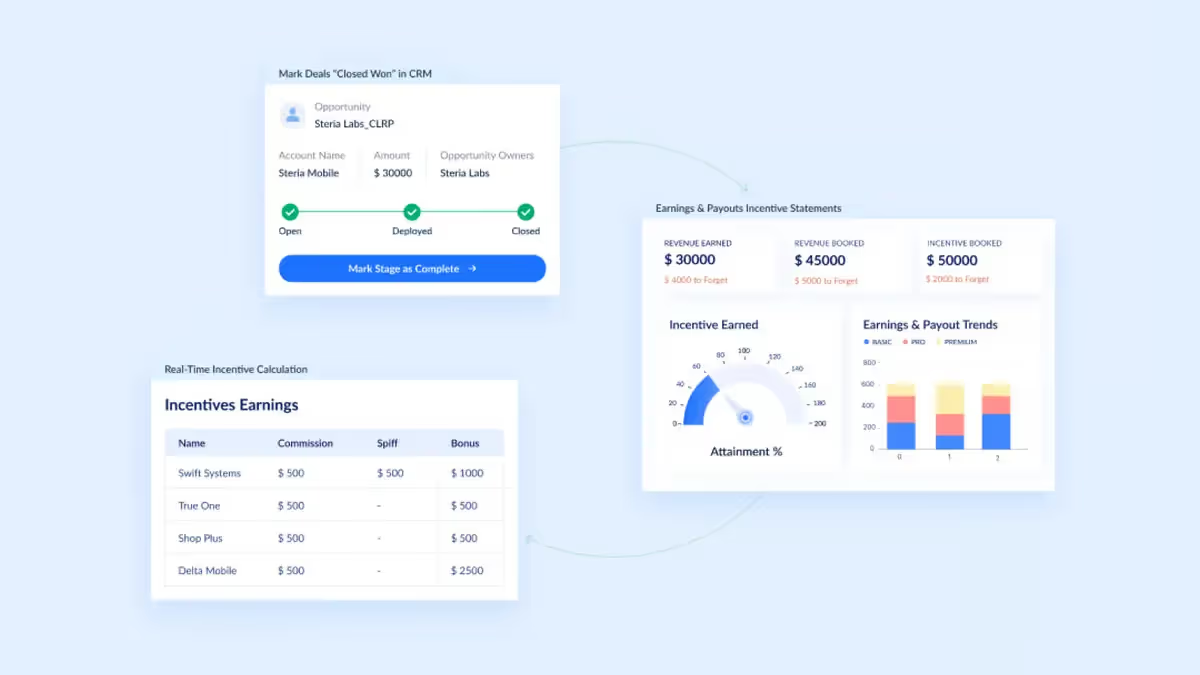
Users appreciate the ability to easily integrate, choose fields, set filter criteria, and sync schedules. The platform offers IC dashboards that offer quick visibility into achievements and earnings.
Pros of Visdum:
1. Seamless integration with existing systems streamlines sales compensation management.
2. Intuitive design and navigation enhance efficiency.
3. Versatile handling of diverse sales compensation plans.
Cons of Visdum:
1. Initial plan setup may be time-consuming, despite swift change request handling.
2. CaptivateIQ
CaptivateIQ is another ICM tool praised for its intuitive design, automated commission calculations, and excellent customer service.

The platform's flexibility in managing complex commission structures and clear visual representation of calculations have impressed users. Its integration with CRM and accounting software has greatly improved sales operations effectiveness.
Pros of CaptivateIQ:
1. Robust analytics provide insightful sales performance data.
2. Efficient CRM integration ensures seamless data synchronization.
3. User-friendly interface enhances overall experience.
Cons of CaptivateIQ:
1. Learning curve may require initial training for full feature utilization.
2. Extensive customization options may be complex for non-technical users, affecting ease of use.
3. Commissionly
Commissionly delivers a comprehensive commission management platform with robust reporting capabilities.

Users value the platform's ability to handle complex commission structures and tiered payment systems. The automated payment calculations and detailed performance tracking are frequently highlighted features. However, some users note that the initial setup process requires significant time investment.
Pros of Commissionly
1. Eliminates calculation errors and disputes with a transparent, automated commission tracking system.
2. Provides sales reps with mobile access to earnings data, supporting motivation and performance insights on-the-go.
Cons of Commissionly
1. Limited customization options for dashboard views based on different user roles and permissions.
2. Occasional synchronization delays with external CRM systems and sometimes overwhelming interface for new users.
4. Incentivate
Incentivate offers a flexible sales compensation management solution with extensive customization options.
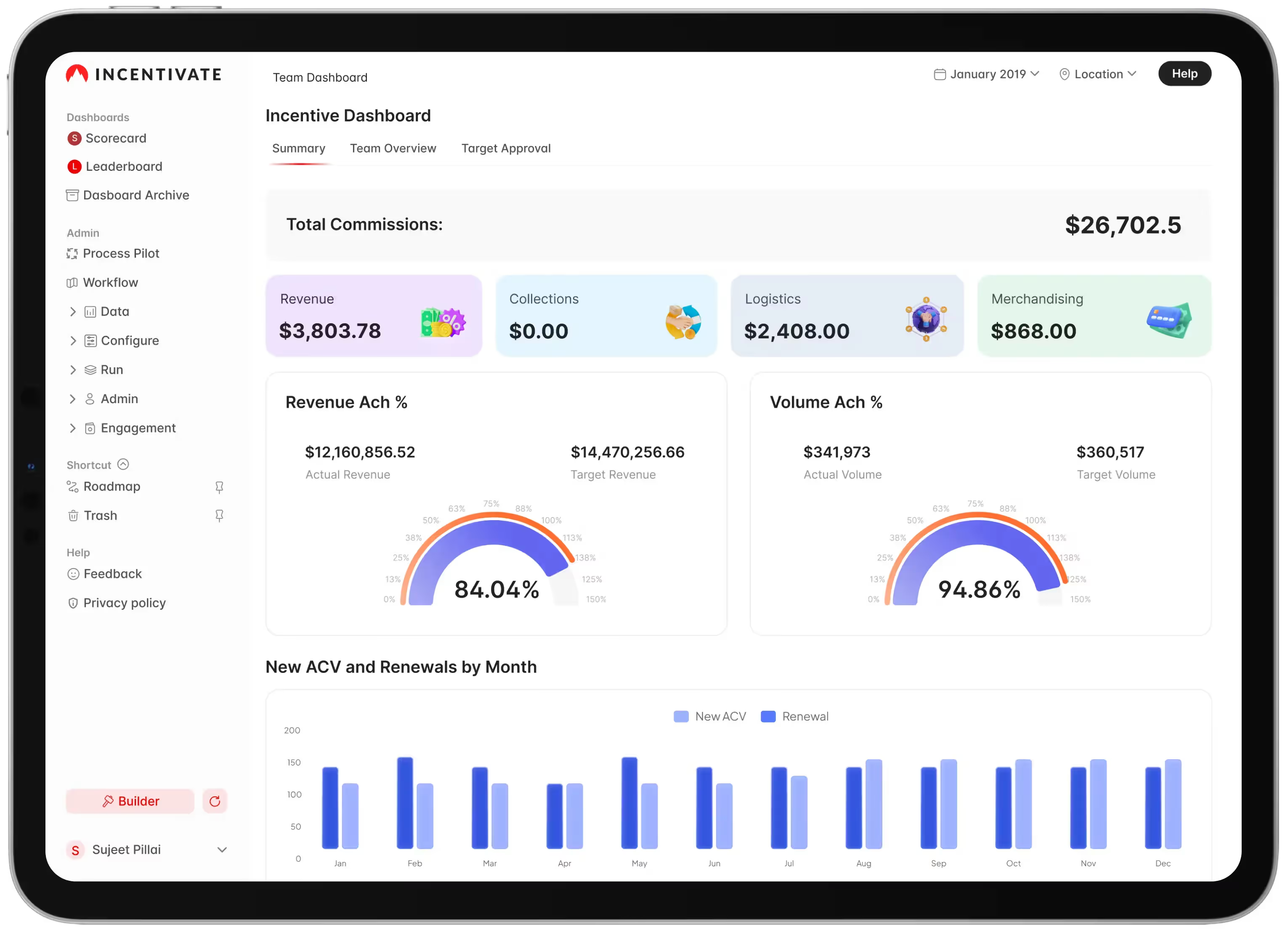
Users appreciate the platform's adaptable commission structures and the ability to model different incentive scenarios. The detailed analytics and performance visualization tools receive consistent praise. However, some users report a steeper learning curve compared to simpler solutions.
Pros of Incentivate
1. Supports complex team hierarchies and split commissions, accommodating diverse organizational structures.
2. Delivers actionable insights through AI-powered forecasting tools, helping sales leaders optimize incentive strategies.
Cons of Incentivate
1. Challenges in implementing retroactive commission changes and adjustments to historical data.
2. Heavier administrative overhead and occasional performance issues with large data sets.
5. Xactly Incent
Xactly Incent provides an enterprise-grade commission management system with advanced analytics capabilities.
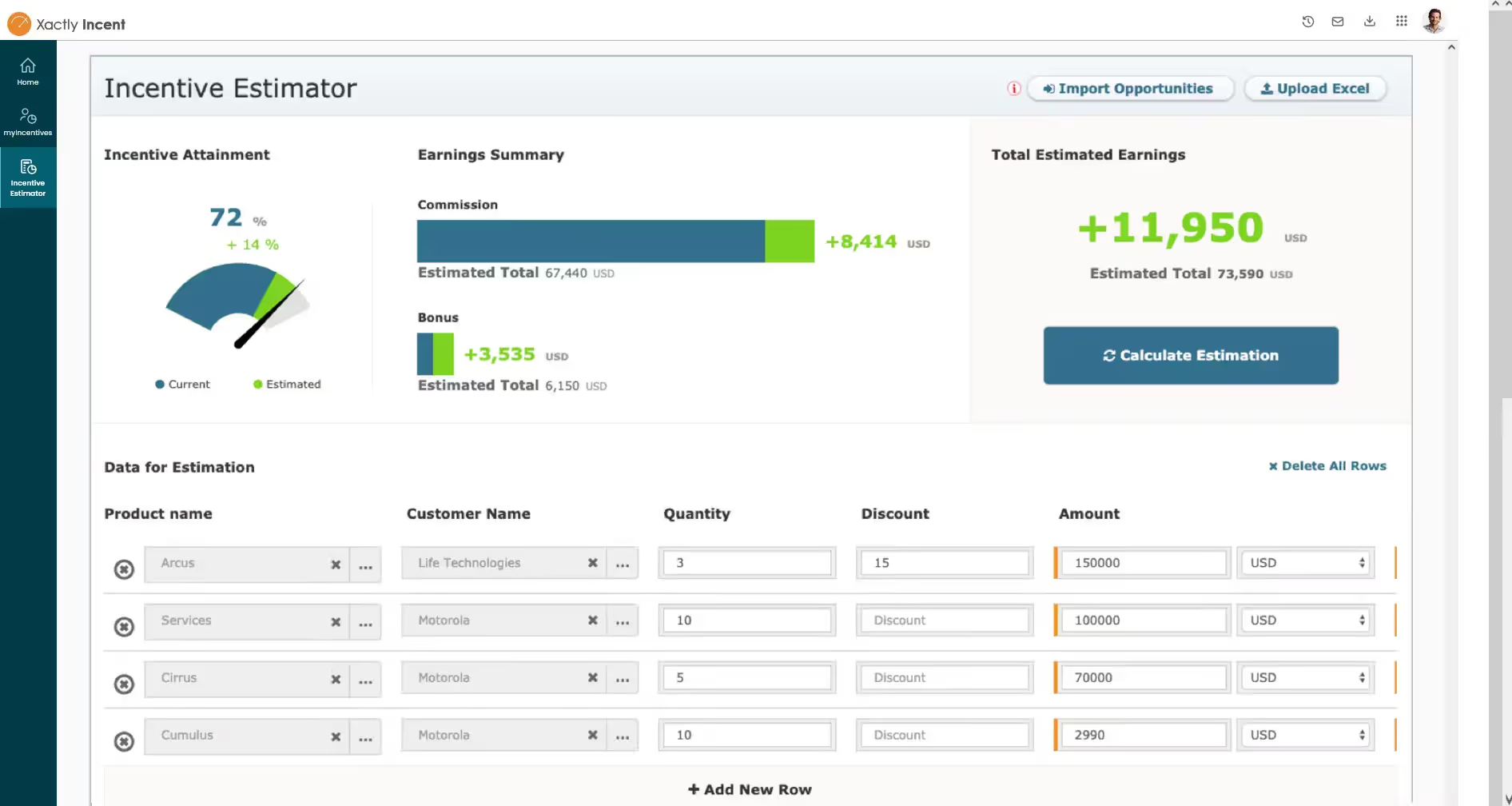
Users value the platform's extensive integration ecosystem and sophisticated modeling tools. The historical performance tracking and benchmarking features are highlighted as particularly valuable. However, some users find the system requires dedicated administration resources.
Pros of Xactly Incent
1. Enhances compensation plan design with industry benchmarking data and built-in best practices.
2. Streamlines auditing and compliance processes with comprehensive documentation and approval workflows.
Cons of Xactly Incent
1. Significant implementation time and resources required before realizing full platform benefits.
2. Complex user interface that sometimes sacrifices simplicity for feature depth and occasional reporting limitations.
Want to dive deeper into the pros, cons, and key features of more sales incentive compensation management platforms?
Check out our blog post, "10 Best Sales Compensation Software in 2024 to Supercharge Your Revenue Goals".
Step-By-Step to Choosing an Incentive Compensation Management Software
With so many ICM platforms in the market, selecting the right one for your business can seem daunting. Let's learn how to select the perfect incentive compensation management software from the ones in the market that can fulfill all your ICM needs.
Follow these eight steps to make an informed decision:
1. Assess Your Business Needs
Start by clearly defining your business objectives and the challenges you face with your current compensation management process. Think of roadblocks such as lack of flexibility, time investment, lack of visibility, etc.
Consider these questions:
- Do you have a dedicated Sales Comp Analyst? If not then, you may need software that is self-served and business user-friendly. It should be intuitive with a good UX.
- Do you face a lot of inquiries/disputes from your payees? If so, you may need software that automates this workflow as it would avoid a lot of back and forth.
- Do you have a tiered commission structure that has commission rates based on sales performance tiers? Would the commission tool allow for easy creation and modification of this structure while maintaining past history?
A clear answer to these, along with consideration for company size, industry, and sales cycle complexity, can lead to the right choice.
2. Research and Shortlist ICM Vendors
Conduct thorough research to identify software vendors that specialize in your industry and have a proven track record of success. Look for reviews, case studies, white papers, and testimonials to shortlist potential vendors.
Does your ICM software check the following?
- Use predefined rules and formulas to calculate sales commission payouts based on your criteria and plan logic
- Integrate with customer relationship management and/or billing systems and pull sales activity and customer transaction data to calculate commissions automatically
- Provide automation that saves time and reduces errors and discrepancies in commission payouts
3. Evaluate ICM Software Features
Match your business needs with the features offered by each vendor. Prioritize software that offers the flexibility to create diverse compensation plans, robust reporting, and analytics, and integrates seamlessly with your existing tools.
Assess their ability to:
- Handle complex plan designs and crediting rules
- Scale with your business over time
- Integrate with your existing systems
- Provide transparency and audit -trails
- Support compliance requirements
- Offer a user-friendly interface
4. Consider Implementation and Support
Evaluate the vendor's support services, including implementation assistance, training resources, and customer support availability. A vendor that offers comprehensive support will ensure a smoother transition and help you maximize the value of your investment.
Look for:
- A proven implementation methodology and timeline
- Dedicated project management and training resources
- Ongoing technical support and customer success services
- Regular software updates and enhancements
5. Request Custom Demos, Trials or POCs
Before making a final decision, request live demonstrations and, if possible, a trial period to test the software in your environment. This will give you a hands-on understanding of how well the incentive compensation management software meets your needs and how intuitive it is for your team.
During these, assess:
- Ease of use and intuitiveness of the interface
- Ability to handle your specific use cases and scenarios
- Performance and speed of calculations
- Quality and relevance of reporting and analytics
6. Analyze Total Cost of Ownership
Consider not just the upfront cost but also the total cost of ownership, including implementation, training, support, and any additional fees for updates or add-ons. Opt for a solution that offers transparent pricing and aligns with your budget.
Factor in:
- Implementation and integration costs
- Training and change management efforts
- Ongoing support and maintenance fees
- Hardware or infrastructure upgrades
- Opportunity costs of not having the right system in place
7. Get Feedback from Your Sales Team
Involving your sales team in the selection process is mandatory- They are the best to test features and usability. Their feedback can be instrumental in choosing a solution that they will readily adopt and benefit from.
Solicit their input on:
- The most critical pain points to address
- The usability and relevance of each platform
- The feasibility of implementation and adoption
- The alignment with long-term business goals
After these 7 steps, you should be on firm ground to make the best decision for your company.
Other Sales Incentive Compensation Management Software
1. AdvantageClub.ai
The AI powered AdvantageClub.ai platform is known to boost loyalty, retention, and performance for employees, customers, and partners.
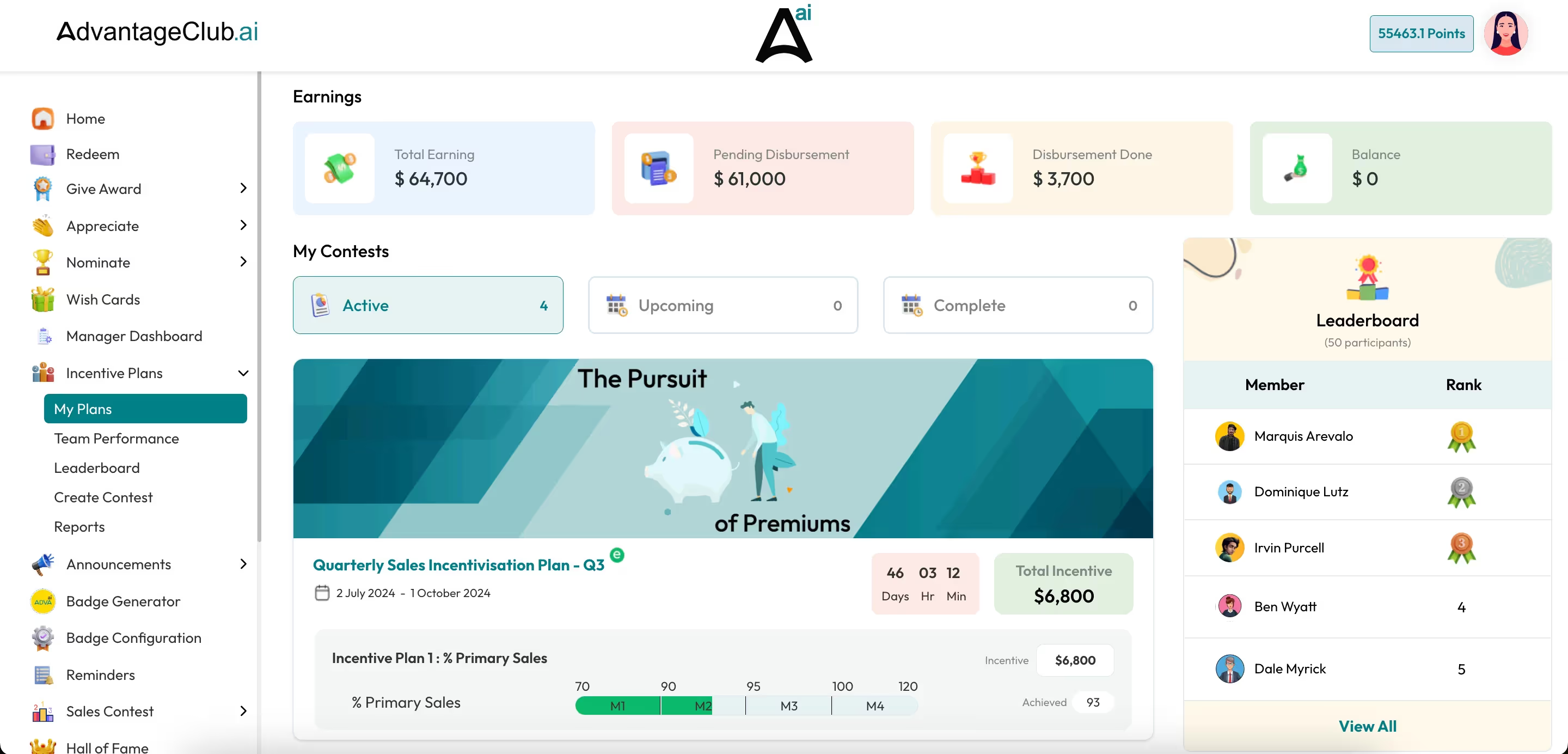
Users find the platform's analytics and dashboards helpful for managing KPIs. The automated incentive system works well. The redemption marketplace, with its customizable, rule-based points system, helps maximize engagement.
Pros of AdvantageClub.ai:
1. The platform provides a live view of achieved KPIs against quotas, allowing team leads to monitor their team's progress.
2. Customizable advanced analytics and dashboarding to effortlessly manage KPI tracking, incentive calculation, and disbursement.
3. AI assisted smart nudges to help the sales team reach & exceed targets.
Cons of AdvantageClub.ai:
1. Users may require additional support to fully leverage the power of analytics and dashboard features.
2. No free trial available for users.
Wrapping Up
The journey to selecting the right incentive compensation management software is crucial for enhancing your sales team's performance and aligning with your strategic goals. What this means in everyday life is that a good ICM can lead to a happier, more productive sales team. Performance goals and incentive programs should be designed together to go hand in hand as a companion to sales.
The best stakeholders for this discussion are the sales reps. Talk to your sales team- understand what they need and how they imagine growth with any software.
By focusing on software that offers comprehensive incentive compensation management features and aligns with your business requirements, you can build a foundation for sustained sales success and growth.
FAQs
What is incentive compensation management (ICM)?
Incentive compensation management (ICM) is the process of designing, administering, and analyzing compensation plans that can effectively motivate and reward employees for achieving specific goals or objectives. ICM handles incentives, bonuses, commission tiers, etc. to ensure high sales morale and productivity.
What is incentive compensation management software?
Incentive compensation management software or ICM tool is software that automates the process of managing employee incentive compensation plans and helps execute the incentive compensation strategy. It enables plan design, implementation, and tracking of complex compensation structures, calculates payouts based on performance data, and provides transparency to sales reps.
What are the three types of incentive systems for employee compensation?
Employee incentives come in three forms: individual rewards based on personal performance like sales targets and bonuses; team incentives that promote collaboration through group performance metrics; and organizational incentives like profit-sharing and stock options that reward company-wide achievement and align everyone's goals.
What is the role of an incentive compensation manager?
An incentive compensation manager designs and oversees organizational bonus and incentive plans, aligning them with company goals and market standards. They develop performance metrics, manage plan administration, collaborate with stakeholders, monitor effectiveness, ensure compliance, and provide support to participants.
How does ICM work?
An ICM fetches sales deal data from the CRM and calculates commissions and incentives based on who handles the deal. The rules and criteria can be fed to the ICM tool and it generates commission statements automatically. It removes the hassle of creating formulas and managing incentives on spreadsheets.
What is the difference between incentive compensation and commission?
While commissions are a fixed percentage of the sale value awarded to salespersons as their 'share' in the sale, incentives can be rewarded for any purpose the company wants- performance-linked incentives, seasonal incentives, non-monetary incentives, etc. are some of the incentives companies usually offer to boost productivity and motivation in employees.

.webp)
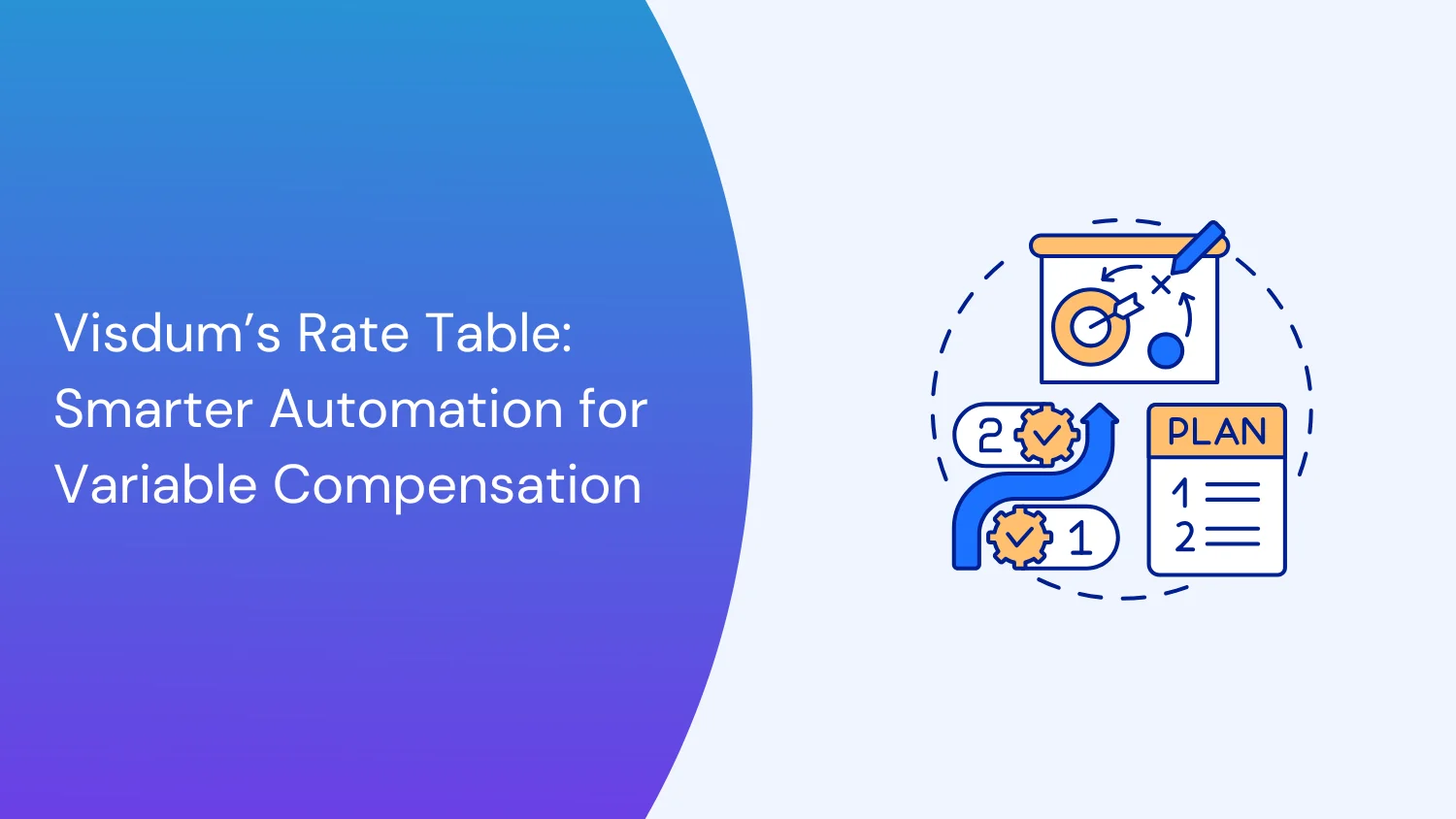
.webp)

